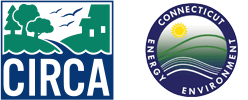Monday, November 20, 2017

Workshop Presentations:
- Workshop overview and related projects and resources, Rebecca French – CIRCA, Director of Community Engagement, CIRCA overview
- Overview of Connecticut living shoreline permit process – Tonia Selmeski and John Gaucher, Environmental Analysts CT DEEP Land and Water Resources Division, SW District, DEEP overview
- Hepburn Dune and Marsh, Fenwick, Marilyn Ozols – Land Use Administrator, Borough of Fenwick, Fenwick concept design
- East Shore Park, New Haven, Giovanni Zinn – City Engineer, City of New Haven, New Haven concept design
- Federal perspective on mock designs and permitting: Cori Rose, Senior Project Manager, US Army Corps of Engineers, Regulatory Division, USACE overview
- Federal perspective on mock designs and permitting: Alison Verkade, Marine Habitat Resource Specialist, National Oceanic and Atmospheric Administration, NMFS, NOAA overview
Workshop Resources:
CIRCA Wave Data to Design Living Shorelines – provides links to wave data generated by CIRCA, a site suitability tool, and publications on regulatory considerations and guidance.
Grant Partner Products: Northeast Regional Ocean Council and The Nature Conservancy, MA Chapter. CIRCA and CT DEEP staff contributed to the writing and editing of these materials as the Connecticut representatives for the Northeast Regional Ocean Council workgroup formed as part of the grant from NOAA that funded the workshop. These materials are meant to serve as a regional resource and do not replace Connecticut-specific guidance and regulation. Contact CT DEEP for regulatory guidance on living shorelines.
Workshop Information
Location:
UConn, Avery Point Campus, Marine Sciences Building, Room 103
1080 Shennecossett Rd. Groton, CT 06340
Living shoreline_Nov 20 final agenda
Please register for this free workshop by November 10, 2017 since space is limited to 60 participants.
Description:
Sea-level rise and storms are increasing erosion and inundation of coastal wetlands across New England and threaten property and valuable natural resources. The term “living shoreline” refers to a shoreline management practice which restores, enhances, maintains or creates natural coastal or riparian habitat, functions and processes and also functions to mitigate flooding or shoreline erosion through a continuous land-water interface. Coastal and riparian habitats include but are not limited to intertidal flats, tidal marsh, beach/dune systems, and bluffs. Living shorelines may include structural features that are combined with natural components to attenuate wave energy and currents.
UCONN’s Connecticut Institute for Resilience and Climate Adaptation (CIRCA) in partnership with the Connecticut Department of Energy and Environmental Protection (DEEP) invite you to attend a free workshop on putting living shorelines projects into practice. This workshop will provide an update about the state of living shorelines in Connecticut, highlight existing projects and research, and overview related permitting processes. Design concepts for both a larger, municipal site and a smaller, residential/land trust site will be explained. These two sites will then be used to run through a mock permit review exercise in small breakout groups with guidance from DEEP environmental analysts. The workshop is designed to provide opportunities to network with fellow practitioners while sharing lessons learned.
Who Should Attend: This workshop targets consultants, project designers, landscape architects, restoration ecologists and engineers in Connecticut. Space at the workshop is limited to facilitate a robust conversation around the workshop topics.
Avery Point Campus Map: UConn Parking Pass Directions
Parking:
Complimentary parking is provided to reserve parking enter your vehicle license plate.
Parking for this event is valid from 11/20/2017 07:00 am to 06:00 pm.
Please note: Parking is in Area D or A
Food: Lunch will be provided to participants free of charge.
Questions: Please contact Kim Bradley at kimberly.bradley@uconn.edu with any questions.
Funding for this workshop is provided by NOAA’s Office for Coastal Management 2015-2016 Regional Coastal Resilience Grant Program to the Northeast Regional Association of Coastal and Ocean Observing Systems (NERACOOS) and state coastal program members and partner organizations and research institutions of the Northeast Regional Ocean Council. This grant program is designed to help coastal communities improve their resilience to adverse events by improving their ability to prepare for and respond to a variety of coastal threats, including extreme weather events, climate hazards, and changing ocean conditions. The focus is on comprehensive regional approaches that use science-based solutions and rely on collaborative partnerships to ensure success.
If you require an accommodation to participate in this event, please contact Lauren Yaworsky at lauren.yaworsky@uconn.edu or 860-405-9124.
